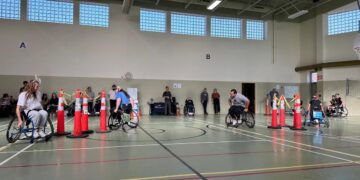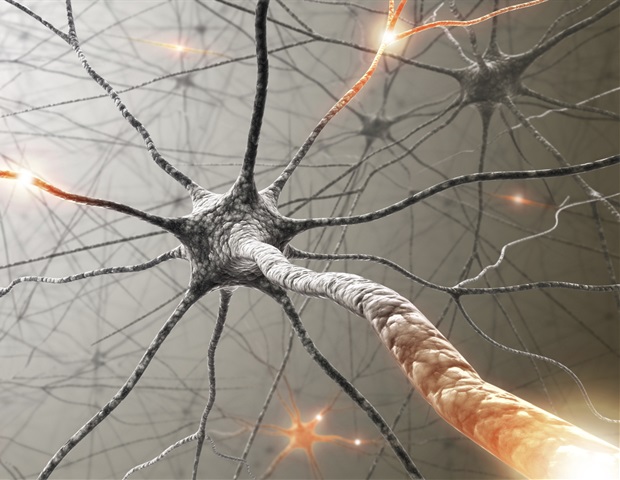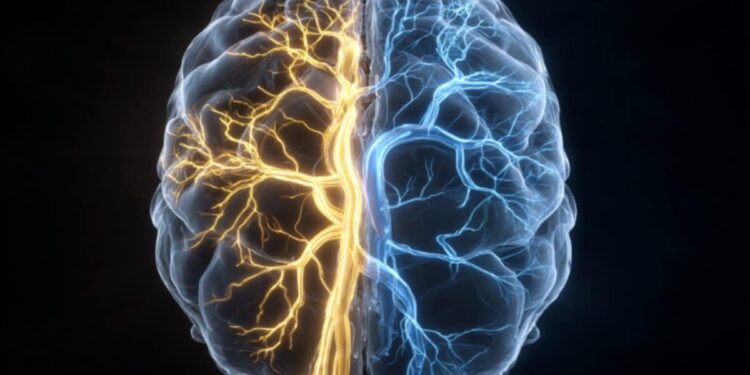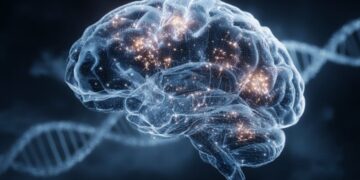Summary: Researchers have found that problems with the brain’s waste disposal system (the glymphatic system) can significantly increase the risk of developing dementia. In one of the largest studies to date, MRI data from 40,000 adults revealed that altered cerebrospinal fluid (CSF) flow predicts dementia risk years before symptoms appear.
The findings show that cardiovascular problems, such as high blood pressure, can damage this system and worsen the buildup of toxins in the brain. Improving sleep quality and controlling blood pressure could help keep this system functioning and reduce the risk of dementia.
Key facts:
Waste removal link: Impaired lymphatic system function predicted dementia risk in 40,000 adults. Cardiovascular impact: High blood pressure and other vascular risk factors disrupted brain waste flow. Preventive potential: Good sleep and blood pressure control can protect lymphatic function and reduce the risk of dementia.
Source: University of Cambridge
Problems with the brain’s waste disposal system could underlie many cases of dementia and help explain why poor sleep patterns and cardiovascular risk factors, such as high blood pressure, increase the risk of dementia.
A study led by researchers at the University of Cambridge found that impaired movement of cerebrospinal fluid (CSF), the clear fluid that cushions and cleans the brain, predicted future dementia risk among 40,000 adults recruited to the UK Biobank.
Their findings are published today in Alzheimer’s & Dementia: The Journal of the Alzheimer’s Association.
In the healthy brain, the so-called glymphatic system serves to eliminate toxins and waste materials, keeping the brain healthy. This system, recently discovered in 2012, works by expelling CSF through the brain along small channels around blood vessels known as perivascular spaces. It collects waste and then drains it from the brain, helping to keep it clean and healthy.
The lymphatic system is thought to be important in protecting against many of the common forms of dementia, which are often characterized by the buildup of toxic substances in the brain; For example, in Alzheimer’s disease, amyloid “plaques” and tau tangles accumulate in brain tissue.
One of the most common forms of dementia is vascular dementia, caused by reduced blood flow to the brain. The most common cause of this type of dementia is cerebral small vessel disease, which affects the small blood vessels in the brain.
But the impact of cerebral small vessel disease is even greater because it also interacts with other dementias and worsens them; For example, a study of nuns in the US found that among those nuns whose brains showed signs of Alzheimer’s disease post-mortem, only about half had symptoms of dementia, but this increased to about nine in 10 if they also had cerebral small vessel disease.
Professor Hugh Markus and his colleagues at the University of Cambridge wanted to test whether brain small vessel disease and other cardiovascular risk factors damage the lymphatic system and whether this, in turn, increases the risk of dementia.
Until recently, it was only possible to study lymphatic function in mice, but recent advances in MRI have made it possible to study it indirectly in humans. Still, it was only possible to do this practically in relatively small quantities, but Yutong Chen, while a medical student at the University of Cambridge, developed machine learning algorithms capable of assessing lymphatic functions from scaled MRI scans.
The team applied the algorithm to MRI scans taken on around 40,000 adults at the UK Biobank. They found three biomarkers (biological signatures) associated with impaired lymphatic function, assessed at the start of the study, that predicted the risk of dementia occurring over the next decade.
One of them was DTI-ALPS, a measure of the diffusion of water molecules throughout perivascular spaces. Another was the size of the choroid plexus, where CSF is produced. The third measurement reflected the speed of CSF flow to the brain.
Yutong Chen, from the Department of Clinical Neurosciences at Cambridge, said: “Although we have to be cautious with surrogate markers, our work provides good evidence in a very large cohort that disruption of the lymphatic system plays a role in dementia. This is exciting because it allows us to ask: how can we improve this?”
Further analysis showed that several cardiovascular risk factors altered lymphatic function and therefore increased the risk of dementia, and that this was partly because they caused disease of the small vessels in the brain, which is visible on MRI scans.
First author Hui Hong, now a radiologist at the Second Affiliated Hospital of Zhejiang University, Hangzhou, China, said: “We already have evidence that small vessel disease in the brain accelerates diseases such as Alzheimer’s, and we now have a likely explanation for why. Disruption of the glymphatic system is likely to affect our ability to clear the brain of the amyloid and tau that cause Alzheimer’s. Alzheimer’s”. disease.”
Research suggests possible approaches to reduce the risk of dementia. One is to look for strategies to improve glymphatic function. Sleep plays an important role in lymphatic function, so altered sleep patterns are likely to affect your ability to eliminate toxins. Alternatively, there may be medications that could be repurposed, or new ones developed, to improve glymphatic function.
Another possible approach is to treat vascular risk factors such as high blood pressure. This is supported by recent studies: the SPRINT MIND trial, for example, showed that intensive blood pressure control (maintaining a systolic blood pressure below 120 mm Hg) led to a 20% reduction in cognitive decline or dementia compared to participants in the standard treatment group.
Professor Markus, who leads the Stroke Research Group at the University of Cambridge and is a Fellow of Clare Hall, Cambridge, said: “We already know the importance of cardiovascular risk factors when it comes to dementia, and our findings further emphasize this link.
“At least a quarter of all dementia risk is due to common risk factors such as blood pressure and smoking. If these affect lymphatic function, then we can intervene. Treating high blood pressure or encouraging people to stop smoking would be a feasible way to help the lymphatic system work better.”
Professor Bryan Williams, scientific and medical director of the British Heart Foundation, said: “This study gives us a fascinating insight into how problems with the brain’s waste disposal system could be quietly increasing the chances of developing dementia in the future.
“By improving our understanding of the lymphatic system, this study opens exciting new avenues of research to treat and prevent dementia. It also emphasizes the importance of controlling known cardiovascular risk factors, such as high blood pressure, to reduce the risk of dementia.”
Funding: The research was funded by the British Heart Foundation, with additional support from the National Institute for Health and Care Research’s Cambridge Biomedical Research Centre.
Key questions answered:
A: The glymphatic system is the brain’s cleansing network that removes toxins and waste through the cerebrospinal fluid (CSF). Disruption of this system can cause the buildup of toxins, which could contribute to dementia.
A: High blood pressure and small vessel disease affect lymph flow, reducing the brain’s ability to remove waste such as amyloid and tau proteins associated with Alzheimer’s disease.
A: Yes. The study suggests that regular deep sleep and treatment of vascular risk factors may improve waste removal in the brain, offering practical ways to protect against cognitive decline.
About this research news on dementia and neurology
Author: Craig Brierley
Source: University of Cambridge
Contact: Craig Brierley – University of Cambridge
Image: Image is credited to Neuroscience News.
Original research: Open access.
“MRI markers of cerebrospinal fluid dynamics predict dementia and mediate the impact of cardiovascular risk” by Hugh Markus et al. Alzheimer’s and dementia
Abstract
MRI Markers of Cerebrospinal Fluid Dynamics Predict Dementia and Mediate Impact of Cardiovascular Risk
INTRODUCTION
Altered cerebrospinal fluid (CSF) dynamics may contribute to dementia, but evidence in humans is limited. We examined associations between MRI-based indicators of CSF dynamics and incident dementia, and whether CSF dysfunction mediates the links between cardiovascular risk and dementia.
METHODS
Using the UK Biobank, we measured CSF dynamics: perivascular space volume (PVS), diffusion tensor imaging analysis along the PVS (DTI-ALPS), blood oxygen level-dependent CSF coupling (BOLD-CSF), and choroid plexus (CP) volume. We assessed cardiovascular risk factors and their associations with CSF dynamics and dementia based on hospital, mortality, and GP records. Mediation analysis evaluated CSF dysfunction in cardiovascular risk-dementia relationships.
RESULTS
Lower DTI-ALPS, lower BOLD-CSF coupling, and higher CP volume predicted dementia, but PVS volume did not. DTI-ALPS volume and CP mediated the effect of white matter hyperintensities and duration of diabetes on dementia.
DISCUSSION
Altered CSF dynamics may cause dementia and partially mediate the associations between cardiovascular risk and dementia.

_6e98296023b34dfabc133638c1ef5d32-620x480.jpg)


















